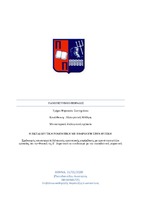Σχεδιασμός και εφαρμογή διδακτικής ερευνητικής παρέμβασης με πρωτότυπα φύλλα εργασίας για την Φυσική της Ε΄ Δημοτικού σε συνδυασμό με την εκπαιδευτική ρομποτική

Προβολή/
Λέξεις κλειδιά
Jigsaw ; Φύλλα εργασίας ; Φυσική της Ε' Δημοτικού ; Εκπαιδευτική ρομποτική ; STEM ; Lego WeDo 2.0Περίληψη
Τις τελευταίες δεκαετίες η τεχνολογία έχει γίνει αναπόσπαστο κομμάτι της ζωής των ανθρώπων, όλων των ηλικιών, καθώς τους βελτιώνει το βιοτικό τους επίπεδο και εξυπηρετεί πολλές ανάγκες τους όπως αυτές για επικοινωνία, ψυχαγωγία, πληροφόρηση, και άλλες. Αυτό ισχύει πολύ περισσότερο για τα παιδιά τα οποία γεννήθηκαν και μεγάλωσαν σε μία εποχή στην οποία η τεχνολογία υπήρχε παντού γύρω τους. Έχουν συνηθίσει την ευκολία της πρόσβασης στη γνώση μέσω του Διαδικτύου, την γρήγορη εναλλαγή των εικόνων στα βίντεο, αλλά και τις απεριόριστες δυνατότητες μάθησης, τις οποίες παρέχει γενικότερα η τεχνολογία. Ωστόσο, η χρήση της στην πρωτοβάθμια και δευτεροβάθμια εκπαίδευση βρίσκεται ακόμη σε πολύ πρώιμο στάδιο. Η έλλειψη τεχνολογικού εξοπλισμού αλλά και κατάρτισης στους εκπαιδευτικούς για την χρήση του και την εκπαιδευτική του αξιοποίηση είναι οι βασικοί λόγοι αυτού.
Ως εκ τούτου, το μάθημα των Φυσικών επιστημών συχνά λαμβάνει έναν θεωρητικό χαρακτήρα, με τους μαθητές να μαθαίνουν τους νόμους και τις έννοιες της Φυσικής χωρίς να τους εφαρμόζουν πειραματικά και να τους κατανοούν με αποτέλεσμα η γνώση να είναι στείρα. Επιπλέον, οι μαθητές από την στιγμή που επικοινωνούν με το περιβάλλον τους, το παρατηρούν και σχηματίζουν ιδέες και αντιλήψεις για τον τρόπο που λειτουργεί ο κόσμος και για τις Φυσικές έννοιες, οι οποίες πολύ συχνά είναι λανθασμένες. Για τον λόγο αυτό, είναι επιτακτική η ανάγκη ανάδειξης των ιδεών αυτών και αλλαγής ή προσαρμογής τους με τις επιστημονικές ιδέες και έννοιες.
Από την άλλη πλευρά, η Εκπαιδευτική Ρομποτική παρουσιάζει θεαματική ανάπτυξη τα τελευταία χρόνια λόγω της σχετικά οικονομικής επιλογής που παρουσιάζει και της προτίμησής της από τους μαθητές. Επιπλέον, προσφέρει απεριόριστες δυνατότητες βιωματικής και διαδραστικής μάθησης, τον συνδυασμό του παιχνιδιού με την εκπαίδευση, την εφαρμογή πολύ δημιουργικών και καινοτομικών στρατηγικών διδασκαλίας όπως είναι αυτή της συνεργατικής, του STEM και της μεθοδολογίας Project-Based Learning. Στηρίζεται στην κονστρουκτιβιστική θεωρία αγωγής, με τον εκπαιδευτικό σε ρόλο διαμεσολαβητή να θέτει στους μαθητές την επίλυση αυθεντικών προβλημάτων με σκοπό την απόκτηση δεξιοτήτων του 21ου αιώνα.
Η παρούσα διπλωματική εργασία συντάχθηκε στο πλαίσιο του Μεταπτυχιακού Προγράμματος του Πανεπιστημίου Πειραιά με τίτλο: «Ηλεκτρονική Μάθηση». Η έρευνα έλαβε χώρα σε ένα τμήμα της Ε’ Δημοτικού Δημόσιου Σχολείου της Αθήνας με τη συμμετοχή 16 μαθητών. Βασική της επιδίωξη αποτέλεσε ο σχεδιασμός, η υλοποίηση και η αξιολόγηση μίας διδακτικής παρέμβασης για την Φυσική στο πλαίσιο της εκπαιδευτικής ρομποτικής και του προγραμματισμού για τις έννοιες της Ταχύτητας, της Δύναμης, της Μάζας και του Βάρους και της Τριβής. Για τον λόγο αυτό σχεδιάστηκαν αντίστοιχα τέσσερα πρωτότυπα φύλλα εργασίας, σύμφωνα με την διερευνητική επιστημονική μέθοδο, το STEM, το PBL και την συνεργατική μάθηση. Το βασικό ερευνητικό ερώτημα της εργασίας είναι η επίδραση της εκπαιδευτικής ρομποτικής σε συνδυασμό με την τυπική εκπαίδευση στην επίδοση των μαθητών στις Φυσικές επιστήμες, καθώς και ποια είναι τα συναισθήματα των μαθητών όταν εργάζονται με το συγκεκριμένο τρόπο στο μάθημα της Φυσικής. Επίσης, ένα δευτερεύον ερευνητικό ερώτημα αποτελεί ο παράγοντας του φύλου στην επίδοση των μαθητών στην Φυσική. Τα αποτελέσματα της έρευνας δεν έδειξαν να υπάρχει σημαντική στατιστική διαφορά ανάμεσα στην επίδοση της ομάδας ελέγχου και αυτής της ομάδας παρέμβασης, αλλά ούτε και ανάμεσα στα δύο φύλα. Ωστόσο, τα συναισθήματά των μαθητών για αυτή την παρέμβαση ήταν χαρά και ενθουσιασμός και η προτίμησή της σε σχέση με την τυπική διδασκαλία ήταν υψηλή.


